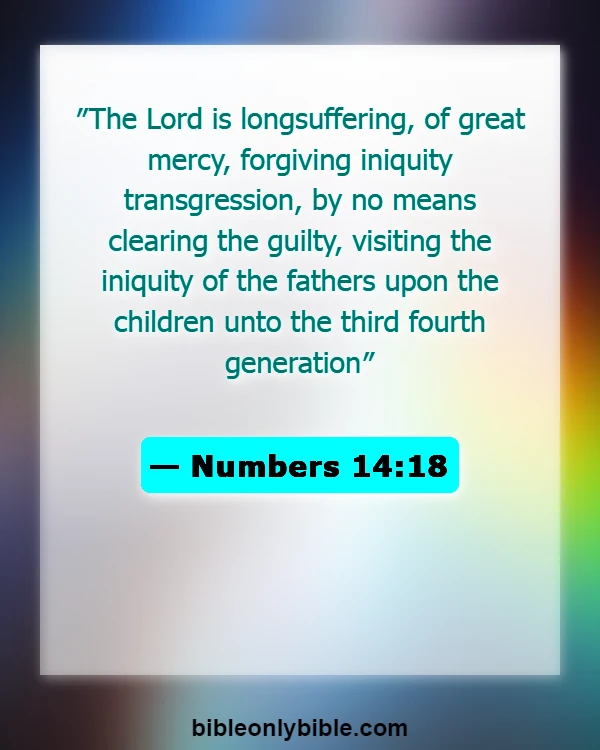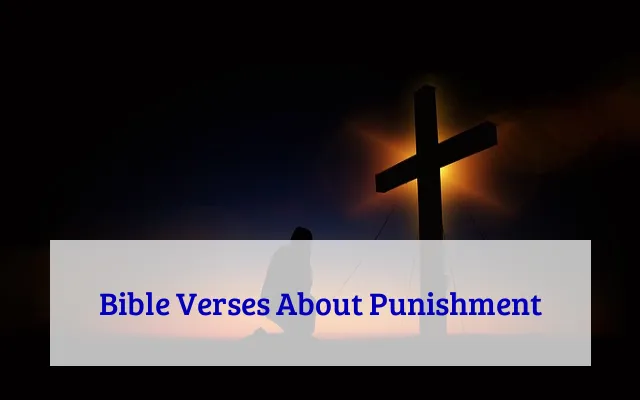Friends, if you’re seeking Bible verses about punishment, this content is for you. Today, I share Bible verses that will help you better understand punishment according to the Bible. These scriptures offer insight into God’s perspective on consequences, discipline, and justice. They reveal both the severity of divine judgment and the possibility of redemption. By exploring these verses, you’ll gain a deeper understanding of how the Bible approaches the concept of punishment and its role in spiritual growth and societal order.
Contents
- 1 What Does the Bible Say About Divine Punishment?
- 2 Bible Verses About God’s Justice and Retribution
- 2.1 Proverbs 21:15 – Justice brings joy to the righteous
- 2.2 Isaiah 61:8 – God loves justice, hates robbery, rewards righteousness
- 2.3 Deuteronomy 32:4 – God’s perfect justice and righteous deeds
- 2.4 2 Thessalonians 1:6 – God repays trouble to those who trouble you
- 2.5 Romans 12:19 – Leave vengeance to God; He will repay
- 3 Old Testament Verses on Punishment and Consequences
- 3.1 Exodus 34:7 – God forgives but holds generations accountable for sins
- 3.2 Leviticus 26:18 – Further punishments for disobedience to God’s commands
- 3.3 Numbers 14:18 – God’s justice includes mercy and consequences
- 3.4 Deuteronomy 11:26 – A choice between blessing and curse is presented
- 3.5 1 Samuel 15:23 – Rebellion and arrogance lead to divine rejection
- 3.6 Ezekiel 18:30 – Repent and turn; avoid iniquity, seek righteousness
- 4 New Testament Teachings on Divine Judgment
- 4.1 Matthew 12:36 – Account for every careless word in judgment
- 4.2 John 5:22 – Judgment entrusted to the Son by the Father
- 4.3 Romans 2:16 – God judges secrets through Jesus Christ
- 4.4 2 Corinthians 5:10 – Everyone judged for deeds, good or evil
- 4.5 Hebrews 9:27 – People die once, then face judgment
- 4.6 Revelation 20:12 – Judgment according to deeds recorded in books
- 5 Bible Verses About Punishment for Sin
- 5.1 Romans 3:23 – All have sinned and fall short of God’s glory
- 5.2 Galatians 6:7 – You reap what you sow for your actions
- 5.3 James 1:15 – Desire leads to sin, sin leads to death
- 5.4 1 John 1:9 – Confession brings forgiveness and cleansing from sin
- 5.5 Isaiah 13:11 – God punishes the world for its evil and sin
- 6 Scripture on Eternal Punishment and Hell
- 6.1 Matthew 25:46 – Eternal punishment for the unrighteous, eternal life for righteous
- 6.2 Mark 9:43 – Avoid sin; better to enter life maimed than hell
- 6.3 Luke 16:23 – Tormented in Hades, sees Abraham from afar
- 6.4 2 Thessalonians 1:9 – Eternal destruction away from God’s presence
- 6.5 Revelation 20:10 – Eternal torment for the devil, beast, and false prophet
- 7 Bible Verses About God’s Discipline vs Punishment
- 8 How Does God Punish According to Scripture?
- 8.1 Deuteronomy 8:5 – God disciplines like a father disciplines his son
- 8.2 Psalm 94:12 – Blessed are those disciplined by the Lord
- 8.3 Jeremiah 30:11 – God disciplines but ensures eventual restoration
- 8.4 Ezekiel 18:23 – God desires repentance over punishment
- 8.5 Amos 3:2 – God’s chosen people face unique accountability
- 8.6 1 Peter 4:17 – Judgment begins with God’s household
What Does the Bible Say About Divine Punishment?
Divine punishment is a theme that runs throughout the Bible, reminding us of God’s holiness and justice. It’s not about cruelty but about bringing humanity back to righteousness. Just like a loving parent disciplines a child, God uses punishment to guide us toward a better path. We can see this as an opportunity for growth and reflection, keeping us aligned with His will.
Romans 6:23 – Sin’s wages are death; God’s gift is eternal life

For the wages of sin is death; but the gift of God is eternal life through Jesus Christ our Lord
Romans 6:23
Explanation:- Romans 6:23 contrasts the consequences of sin with the gift of God. While sin leads to death as its just punishment, God offers eternal life through Jesus Christ as a free gift. This verse highlights the gravity of sin and the hope found in divine grace.
Hebrews 10:30 – Vengeance belongs to the Lord, He will repay

For we know him that hath said, Vengeance belongeth unto me, I will recompense, saith the Lord. again, The Lord shall judge his people
Hebrews 10:30
Explanation:- This verse underscores the concept of divine justice, reminding believers that God is the ultimate judge. It assures us that vengeance and retribution are in God’s hands, encouraging us to trust in His perfect judgment rather than seeking personal revenge.
1 John 4:18 – Perfect love casts out fear of punishment

There is no fear in love; but perfect love casteth out fear: because fear hath torment. He that feareth is not made perfect in love
1 John 4:18
Explanation:- This verse highlights that perfect love eliminates the fear of punishment, suggesting that a deep, genuine love for God and others can liberate us from the anxiety of divine retribution. It encourages believers to embrace love, fostering confidence and peace over fear.
Deuteronomy 32:35 – Vengeance and recompense belong to God

To me belongeth vengeance recompence; their foot shall slide in due time: for the day of their calamity is at hand, the things that shall come upon them make haste
Deuteronomy 32:35
Explanation:- This verse highlights that vengeance and justice are the domain of God. It reassures believers that divine retribution and recompense will occur in God’s timing, emphasizing trust in His ultimate judgment rather than seeking personal revenge.
Bible Verses About God’s Justice and Retribution
God’s justice is perfect and unwavering, ensuring that all actions have consequences. It’s comforting to know that evil does not go unnoticed, and His retribution is fair and just. We can trust in God’s timing and methods, knowing that He sees the bigger picture and will make things right in His own way.
Proverbs 21:15 – Justice brings joy to the righteous

It is joy to the just to do judgment: but destruction shall be to the workers of iniquity
Proverbs 21:15
Explanation:- This verse highlights that justice is a delight to those who live righteously, as it reflects God’s character and ensures fairness. For the wicked, however, justice brings fear because it means accountability and consequences for their actions.
Isaiah 61:8 – God loves justice, hates robbery, rewards righteousness
For I the Lord love judgment, I hate robbery for burnt offering; I will direct their work in truth, I will make an everlasting covenant with them
Isaiah 61:8
Explanation:- This verse highlights God’s commitment to justice and His disdain for wrongdoing. It assures believers that God values righteousness and will reward those who uphold it. The focus is on divine fairness and the promise of retribution against injustice.
Deuteronomy 32:4 – God’s perfect justice and righteous deeds

He is the Rock, his work is perfect: for all his ways are judgment: a God of truth without iniquity, just right is he
Deuteronomy 32:4
Explanation:- This verse highlights God’s unwavering justice and righteousness. It portrays Him as a rock, symbolizing stability and faithfulness. His deeds are perfect, and His ways are just, ensuring that His retribution is fair and His actions are always righteous.
2 Thessalonians 1:6 – God repays trouble to those who trouble you
Seeing it is a righteous thing with God to recompense tribulation to them that trouble you
2 Thessalonians 1:6
Explanation:- This verse highlights God’s justice by reassuring believers that He will repay those who cause them distress. It emphasizes divine retribution, affirming that God is aware of the injustices faced by His people and will act accordingly to bring about justice.
Romans 12:19 – Leave vengeance to God; He will repay

Dearly beloved, avenge not yourselves, but rather give place unto wrath: for it is written, Vengeance is mine; I will repay, saith the Lord
Romans 12:19
Explanation:- This verse encourages believers to refrain from seeking personal revenge. Instead, it emphasizes trusting God to administer justice and retribution in His perfect timing. It underscores the importance of leaving vengeance to God, highlighting His role as the ultimate judge.
Old Testament Verses on Punishment and Consequences
The Old Testament is filled with stories and laws that highlight the importance of obedience and the consequences of straying from God’s commands. These accounts serve as timeless lessons for us today, emphasizing the value of following God’s guidance to live a life that is pleasing to Him and beneficial to our communities.
Exodus 34:7 – God forgives but holds generations accountable for sins
Keeping mercy for thousands, forgiving iniquity transgression sin, that will by no means clear the guilty; visiting the iniquity of the fathers upon the children, upon the children’s children, unto the third to the fourth generation
Exodus 34:7
Explanation:- This verse highlights God’s dual nature of mercy and justice. While God forgives iniquity and transgression, He also holds individuals and their descendants accountable for their sins, emphasizing the enduring consequences of sin and the importance of righteousness across generations.
Leviticus 26:18 – Further punishments for disobedience to God’s commands
If ye will not yet for all this hearken unto me, then I will punish you seven times more for your sins
Leviticus 26:18
Explanation:- Leviticus 26:18 warns of escalating consequences for continued disobedience to God’s commands. It highlights the importance of adhering to divine laws, emphasizing that failure to do so results in increasingly severe punishments, encouraging self-reflection and repentance among the faithful.
Numbers 14:18 – God’s justice includes mercy and consequences

The Lord is longsuffering, of great mercy, forgiving iniquity transgression, by no means clearing the guilty, visiting the iniquity of the fathers upon the children unto the third fourth generation
Numbers 14:18
Explanation:- This verse highlights the balance of God’s character, where divine justice is intertwined with mercy. It acknowledges God’s patience and forgiveness, yet also underscores the reality of consequences for sin, reflecting the dual aspects of compassion and accountability in God’s nature.
Deuteronomy 11:26 – A choice between blessing and curse is presented
Behold, I set before you this day a blessing a curse
Deuteronomy 11:26
Explanation:- This verse highlights the concept of free will, presenting a clear choice between obedience and blessing or disobedience and a curse. It underscores the importance of making choices aligned with God’s commandments, emphasizing the consequences of those choices in the context of divine justice.
1 Samuel 15:23 – Rebellion and arrogance lead to divine rejection

For rebellion is as the sin of witchcraft, stubbornness is as iniquity idolatry. Because thou hast rejected the word of the Lord , he hath also rejected thee from being king
1 Samuel 15:23
Explanation:- This verse highlights that rebellion and arrogance are as serious as witchcraft and idolatry, illustrating the gravity of turning away from God’s commands. It warns that such behavior leads to divine rejection, emphasizing the importance of obedience and humility before God.
Ezekiel 18:30 – Repent and turn; avoid iniquity, seek righteousness
Therefore I will judge you, O house of Israel, every one according to his ways, saith the Lord God . Repent, turn yourselves from all your transgressions; so iniquity shall not be your ruin
Ezekiel 18:30
Explanation:- This verse urges individuals to repent, turn away from wrongdoing, and embrace righteousness. It highlights personal responsibility and the importance of changing one’s behavior to avoid negative consequences. The focus is on transformation and seeking a path aligned with divine principles.
New Testament Teachings on Divine Judgment
The New Testament brings a renewed focus on divine judgment, highlighting both mercy and accountability. Through Jesus, we learn about forgiveness and redemption, but we are also reminded that our actions have eternal significance. This balance encourages us to live with love and integrity, knowing that our choices matter.
Matthew 12:36 – Account for every careless word in judgment

But I say unto you, That every idle word that men shall speak, they shall give account thereof in the day of judgment
Matthew 12:36
Explanation:- This verse highlights the importance of our words, reminding us that every careless statement will be evaluated in the final judgment. It underscores the need for mindfulness and responsibility in our speech, as our words reflect our character and faith.
John 5:22 – Judgment entrusted to the Son by the Father
For the Father judgeth no man, but hath committed all judgment unto the Son
John 5:22
Explanation:- In this verse, divine judgment is entrusted to Jesus by God the Father, highlighting Christ’s authority in determining human destiny. This underscores the New Testament’s teaching that Jesus plays a central role in divine justice and the final judgment.
Romans 2:16 – God judges secrets through Jesus Christ

In the day when God shall judge the secrets of men by Jesus Christ according to my gospel
Romans 2:16
Explanation:- This verse highlights that God will judge the hidden aspects of people’s hearts through Jesus Christ. It underscores the New Testament teaching that divine judgment is comprehensive, reaching beyond outward actions to the intentions and secrets within, emphasizing accountability before God.
2 Corinthians 5:10 – Everyone judged for deeds, good or evil

For we must all appear before the judgment seat of Christ; that every one may receive the things done in his body, according to that he hath done, whether it be good or bad
2 Corinthians 5:10
Explanation:- This verse teaches that all individuals will stand before Christ to be judged based on their actions, whether good or evil. It underscores the New Testament theme of divine judgment, highlighting personal accountability and the importance of living righteously.
Hebrews 9:27 – People die once, then face judgment

As it is appointed unto men once to die, but after this the judgment
Hebrews 9:27
Explanation:- This verse highlights the inevitability of death and the subsequent divine judgment that follows. It underscores the Christian belief that each person is accountable to God, emphasizing the importance of living a life aligned with God’s teachings in anticipation of this judgment.
Revelation 20:12 – Judgment according to deeds recorded in books
I saw the dead, small great, stand before God; the books were opened: another book was opened, which is the book of life: the dead were judged out of those things which were written in the books, according to their works
Revelation 20:12
Explanation:- This verse highlights the final judgment where individuals are assessed based on their deeds, as documented in celestial records. It underscores the New Testament’s emphasis on divine justice and accountability, reminding believers that their actions have eternal significance in God’s eyes.
Bible Verses About Punishment for Sin
Sin separates us from God, but the Bible assures us that we can find forgiveness through repentance and faith. While punishment is a consequence of sin, God’s grace offers us a way back to Him. This understanding motivates us to seek His mercy, turn away from wrongdoing, and embrace a life of righteousness.
Romans 3:23 – All have sinned and fall short of God’s glory

For all have sinned, come short of the glory of God
Romans 3:23
Explanation:- This verse highlights the universal nature of sin, emphasizing that every person has sinned and cannot reach God’s perfect standard on their own. It underscores the need for divine grace and redemption, reminding us that everyone is in need of God’s mercy and forgiveness.
Galatians 6:7 – You reap what you sow for your actions

Be not deceived; God is not mocked: for whatsoever a man soweth, that shall he also reap
Galatians 6:7
Explanation:- This verse underscores the principle of cause and effect in moral and spiritual contexts. Actions have consequences, and one’s deeds, whether good or bad, will ultimately lead to corresponding outcomes. It serves as a reminder of personal accountability and the inevitable results of one’s choices.
James 1:15 – Desire leads to sin, sin leads to death
Then when lust hath conceived, it bringeth forth sin: sin, when it is finished, bringeth forth death
James 1:15
Explanation:- This verse highlights the progression from unchecked desire to sin, and ultimately to spiritual death. It serves as a warning about the consequences of allowing sinful desires to grow, emphasizing the serious nature of sin and its impact on one’s spiritual life.
1 John 1:9 – Confession brings forgiveness and cleansing from sin

If we confess our sins, he is faithful just to forgive us our sins, to cleanse us from all unrighteousness
1 John 1:9
Explanation:- Confession leads to forgiveness and purification from sin. By admitting our wrongdoings, we open ourselves to God’s grace, allowing Him to cleanse us and restore our righteousness. This verse highlights the importance of honesty and repentance in receiving divine mercy and renewal.
Isaiah 13:11 – God punishes the world for its evil and sin

I will punish the world for their evil, the wicked for their iniquity; I will cause the arrogancy of the proud to cease, will lay low the haughtiness of the terrible
Isaiah 13:11
Explanation:- This verse highlights God’s justice in addressing the world’s wrongdoing and sin. It serves as a reminder of divine accountability, where evil actions do not go unnoticed, reflecting a broader biblical theme that God actively intervenes to uphold righteousness and order.
Scripture on Eternal Punishment and Hell
The Bible speaks about eternal punishment as a stark reminder of the seriousness of our spiritual choices. Hell is described as separation from God, emphasizing the importance of choosing a life aligned with His will. This message encourages us to reflect on our lives and seek a deeper relationship with God, avoiding eternal separation.
Matthew 25:46 – Eternal punishment for the unrighteous, eternal life for righteous

These shall go away into everlasting punishment: but the righteous into life eternal
Matthew 25:46
Explanation:- This verse highlights the stark contrast between the destinies of the righteous and the unrighteous. It underscores the concept of eternal consequences, with the unrighteous facing eternal punishment and the righteous receiving eternal life, emphasizing the importance of moral choices and faith.
Mark 9:43 – Avoid sin; better to enter life maimed than hell

If thy hand offend thee, cut it off: it is better for thee to enter into life maimed, than having two hands to go into hell, into the fire that never shall be quenched
Mark 9:43
Explanation:- This verse emphasizes the seriousness of avoiding sin, illustrating that it’s preferable to make significant sacrifices to maintain righteousness. The imagery underscores the reality and severity of eternal punishment, urging believers to prioritize spiritual integrity over physical completeness.
Luke 16:23 – Tormented in Hades, sees Abraham from afar
In hell he lift up his eyes, being in torments, seeth Abraham afar off, Lazarus in his bosom
Luke 16:23
Explanation:- In this verse, the rich man finds himself suffering in Hades, highlighting the theme of eternal punishment. His ability to see Abraham from afar underscores the separation between the righteous and the unrighteous, emphasizing the consequences of earthly actions in the afterlife.
2 Thessalonians 1:9 – Eternal destruction away from God’s presence

Who shall be punished with everlasting destruction from the presence of the Lord, from the glory of his power
2 Thessalonians 1:9
Explanation:- This verse highlights the severity of eternal punishment, describing it as everlasting destruction and separation from the presence and glory of God. It serves as a solemn reminder of the consequences of rejecting God and the importance of faith and obedience.
Revelation 20:10 – Eternal torment for the devil, beast, and false prophet

The devil that deceived them was cast into the lake of fire brimstone, where the beast the false prophet are, shall be tormented day night for ever ever
Revelation 20:10
Explanation:- This verse describes the ultimate fate of evil, where the devil, the beast, and the false prophet are cast into a lake of burning sulfur. It underscores the concept of eternal punishment, highlighting the final and irrevocable defeat of malevolent forces.
Bible Verses About God’s Discipline vs Punishment
There’s a distinction between discipline and punishment in the Bible. Discipline is a form of loving correction intended to guide us back to the right path, while punishment is a consequence of wrongdoing. Understanding this difference helps us appreciate God’s intentions and His desire for us to grow and learn from our mistakes.
Hebrews 12:6 – God disciplines those He loves

For whom the Lord loveth he chasteneth, scourgeth every son whom he receiveth
Hebrews 12:6
Explanation:- Hebrews 12:6 highlights that God’s discipline is an expression of His love, not mere punishment. It reassures believers that when they experience correction, it is a sign of God’s care and desire for their growth, much like a loving parent guides their child.
Proverbs 3:12 – God disciplines those He loves as a father

For whom the Lord loveth he correcteth; even as a father the son in whom he delighteth
Proverbs 3:12
Explanation:- This verse highlights the difference between discipline and punishment, illustrating that God’s discipline stems from love, much like a father’s guidance for his child. It emphasizes that divine correction is a sign of care and a path to growth, not mere retribution.
Revelation 3:19 – God disciplines those He loves

As many as I love, I rebuke chasten: be zealous therefore, repent
Revelation 3:19
Explanation:- This verse highlights that divine discipline stems from love, not wrath. God’s correction aims to guide believers toward growth and righteousness, differentiating discipline from mere punishment. Embracing this process reflects a loving relationship with God, encouraging spiritual maturity and deeper faith.
1 Corinthians 11:32 – Disciplined by the Lord to avoid condemnation
But when we are judged, we are chastened of the Lord, that we should not be condemned with the world
1 Corinthians 11:32
Explanation:- This verse highlights God’s loving discipline, distinguishing it from punishment. Through His correction, believers are guided away from sin and ultimate condemnation. It underscores God’s desire for transformation and growth, ensuring we align with His will and avoid eternal judgment.
How Does God Punish According to Scripture?
God’s punishment in Scripture is not arbitrary; it’s purposeful and redemptive. It’s meant to correct, not to condemn. He uses it to bring about repentance and transformation, always with the ultimate aim of restoring us to a closer relationship with Him. This understanding of God’s nature gives us hope and encourages us to seek His grace and guidance.
Deuteronomy 8:5 – God disciplines like a father disciplines his son

Thou shalt also consider in thine heart, that, as a man chasteneth his son, so the Lord thy God chasteneth thee
Deuteronomy 8:5
Explanation:- This verse highlights that God’s discipline is akin to a father’s loving correction of his child. It teaches that divine punishment is not about retribution but about guidance and growth, aiming to nurture and develop a deeper relationship with Him.
Psalm 94:12 – Blessed are those disciplined by the Lord

Blessed is the man whom thou chastenest, O Lord , teachest him out of thy law
Psalm 94:12
Explanation:- Discipline from the Lord is a form of guidance and correction, leading to spiritual growth and deeper understanding. This verse highlights that such discipline is a blessing, as it aligns believers with God’s wisdom and fosters a closer relationship with Him.
Jeremiah 30:11 – God disciplines but ensures eventual restoration
For I am with thee, saith the Lord , to save thee: though I make a full end of all nations whither I have scattered thee, yet I will not make a full end of thee: but I will correct thee in measure, will not leave thee altogether unpunished
Jeremiah 30:11
Explanation:- In this verse, God promises to discipline His people justly while ensuring their eventual restoration. Although He corrects and punishes, His ultimate goal is their redemption and renewal. This reflects God’s balance of justice and mercy, highlighting His commitment to His people’s future hope.
Ezekiel 18:23 – God desires repentance over punishment

Have I any pleasure at all that the wicked should die? saith the Lord God : not that he should return from his ways, live?
Ezekiel 18:23
Explanation:- In this verse, God expresses a preference for repentance over punishment, highlighting His compassionate nature. Rather than seeking the death of the wicked, God desires their transformation and return to righteousness, emphasizing His hope for redemption and a restored relationship with humanity.
Amos 3:2 – God’s chosen people face unique accountability
You only have I known of all the families of the earth: therefore I will punish you for all your iniquities
Amos 3:2
Explanation:- This verse highlights that being chosen by God comes with greater responsibility. God’s people, set apart by Him, are held to a higher standard and face unique accountability for their actions, emphasizing the seriousness of their covenant relationship and the consequences of disobedience.
1 Peter 4:17 – Judgment begins with God’s household
For the time is come that judgment must begin at the house of God: if it first begin at us, what shall the end be of them that obey not the gospel of God?
1 Peter 4:17
Explanation:- This verse highlights that God’s judgment starts with His own people, underscoring the seriousness of living according to His standards. It serves as a reminder that believers are held accountable and must lead lives reflecting their faith, as they are the first to face divine scrutiny.
